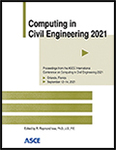Interoperability between BIM and BEM Using IFC
Publication: Computing in Civil Engineering 2021
ABSTRACT
The lack of seamless interoperability between building information modeling (BIM) and building energy modeling (BEM) has been a long-lived problem, which causes two main obstacles: (1) significant time and effort required in building design and energy modeling iterations and (2) limited opportunities for architects to optimize their design informed by BEM. A smooth model information transfer from BIM to BEM can significantly accelerate the BEM process since BEM-related information can be imported from BIM, rather than start from scratch. In the reverse direction, mapping BEM to BIM will provide better opportunities for BEM-informed design optimization and integration with generative design tools, allowing architects more opportunities to improve building designs towards energy efficiency, such as by geometry modifications. In this paper, the authors proposed a new methodology of developing computing technologies to automatically map BEM to BIM following the industry foundation classes (IFC) standard. The authors concluded that the reverse mapping automation from BEM to IFC can be achieved through the state-of-the-art Data-Driven Reverse Engineering Algorithm Development (D-READ) method, based on the invariant signatures of building objects. The developed algorithm was tested on a high-rise residential building model, and it achieved seamless and error-free model transformation. This builds a solid step towards enabling smooth bi-directional modeling workflows between BIM and BEM, and helps move the whole architecture, engineering, and construction (AEC) industry beyond the fairly isolated design and BEM practices towards enabling more opportunities to benefit the buildings’ life cycle from BEM.
Get full access to this article
View all available purchase options and get full access to this chapter.
REFERENCES
Akanbi, T., Zhang, J., and Lee, Y. (2020). “Data-Driven Reverse Engineering Algorithm Development Method for Developing Interoperable Quantity Takeoff Algorithms Using IFC-Based BIM.” Journal of Computing in Civil Engineering, 34(5), 04020036.
BuildingSMART. (2021). “Industry Foundation Classes Version 4.2 bSI Draft Standard.” <https://standards.buildingsmart.org/IFC/DEV/IFC4_2/FINAL/HTML/>(Apr. 7, 2021).
BimSpot. (2021). “Bimspot - Valid building information for better buildings at less costs.” <https://www.bimspot.io/>(Apr. 9, 2021).
Gao, H., Koch, C., and Wu, Y. (2019). “Building information modelling based building energy modelling: A review.” Applied Energy, 238, 320–343.
Kim, H., Shen, Z., Kim, I., Kim, K., Stumpf, A., and Yu, J. (2016). “BIM IFC information mapping to building energy analysis (BEA) model with manually extended material information.” Automation in Construction, 68(August 2016), 183–193.
OpenStudio. (2021). “OpenStudio.” <https://www.openstudio.net/>(Apr. 9, 2021).
Open IFC Viewer. (2021). “Open IFC Viewer.” <https://openifcviewer.com/>(Apr. 9, 2021).
Pinheiro, S., Wimmer, R., O’Donnell, J., Muhic, S., Bazjanac, V., Maile, T., Frisch, J., and van Treeck, C. (2018). “MVD based Information Exchange between BIM and Building Energy Performance Simulation.” Automation in Construction, 90, 91–103.
Ren, R., and Zhang, J. (2021). “A new framework to address BIM interoperability in the AEC domain from technical and process dimensions.” Advances in Civil Engineering, 2021, 8824613.
Ramaji, I., Messner, J., and Mostavi, E. (2020). “IFC-Based BIM-to-BEM Model Transformation.” Journal of Computing in Civil Engineering, 34(3), 04020005.
Steel, J., Drogemuller, R., and Toth, B. (2012). “Model interoperability in Building Information Modelling.” Software and Systems Modeling, 11(1), 99–109.
DOE (US Department of Energy Office of Energy). (2019). “Emerging Technologies Research and Development: DRAFT Research and Development Opportunities for Building Energy Modeling.” <https://www.energy.gov/sites/prod/files/2019/04/f61/bto-bem-rdo-041719.pdf>(Apr. 1, 2021).
Wu, J., Sadraddin, H. L., Ren, R., Zhang, J., and Shao, X. (2021). “Invariant signatures of architecture, engineering, and construction objects to support BIM interoperability between architectural design and structural analysis.” Journal of Construction Engineering and Management, 147(1), 04020148.
Zhang, J. (2018). “Towards systematic understanding of geometric representations in BIM standard: an empirical data-driven approach.” Proc., ASCE Construction Research Congress, ASCE, Reston, VA, 96–105.
Information & Authors
Information
Published In
History
Published online: May 24, 2022
Authors
Metrics & Citations
Metrics
Citations
Download citation
If you have the appropriate software installed, you can download article citation data to the citation manager of your choice. Simply select your manager software from the list below and click Download.
